Recently the boys have been showing an interest in how things work so I thought we'd test out making some simple circuits with them and whilst we were at it learn a bit about what materials conduct electricity. This is what we did....
I bought some simple electronics parts from our local Maplin store. We put 2 AA batteries in a battery box with a snap connector (this connects to the batteries and has two wires coming out of it), We then connected a wire to each side of the light bulb holder and yey, it lit up! Phew!
These aren't the exact products we used, but hopefully they give you an idea of what we created if it's not clear from the pictures. These pictures link to Amazon and are affiliate links:



Once we'd tested out the light bulb we added an extra wire so that we could test how conductive different materials are. Hopefully the diagram below makes sense. You can see Champ above connecting the two wires to prove that the light bulb still lights up.
If I'd had been a bit better prepared this would have been a great opportunity to get the boys to write down what materials they thought would or wouldn't conduct electricity. Unfortunately, I wasn't that organised, but we did discuss it verbally.
The boys understanding of electricity is very simple, but they understand that it makes things work and we talked about how it runs along the wires and how it needs to be in a complete circuit to work.
So, when we talked about conductivity we talked about if the electricity could also run along the different materials.
First, up we tested some Lego, which didn't work.
Next up a fork, which did work.
Then an eraser which despite predictions fro the boys didn't work.
And, the end of the screwdriver which they predicted would work having picked up that metal conducts electricity.
They then rushed off round the garden to find other things to test at which point I stopped taking photos as a bit more supervision was required!
We did talk about safety and that electricity isn't for playing with and should only we used for experiments with a grown up. But, with it only being 2AA batteries they could safely touch both the wires at the same time and not even get a buzz from the wires. Please only do with your kids what you are confident in.
The boys thoroughly enjoyed this and now we have the basic kit I think we'll be doing a few more experiments - if you have any suggestions please let me know in the comments.

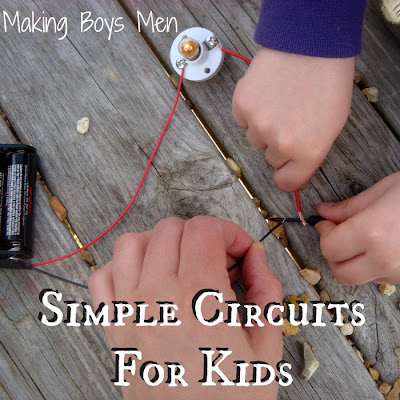
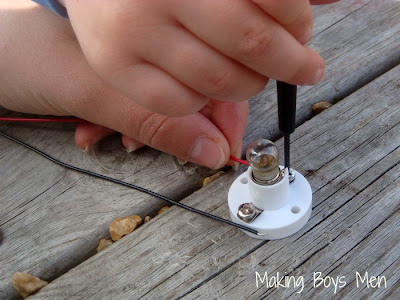
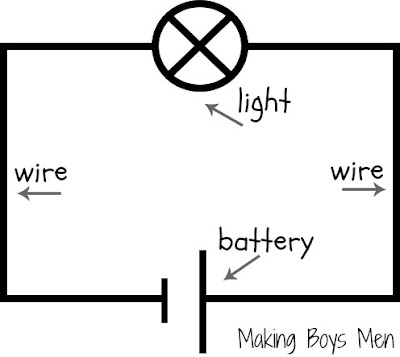
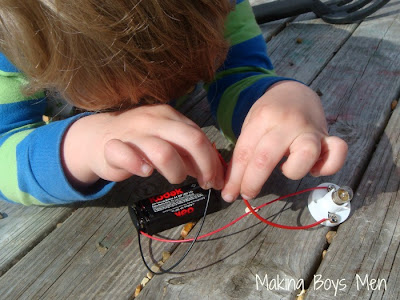
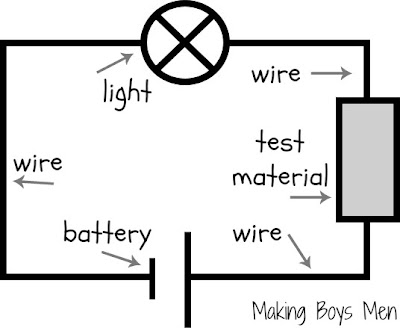
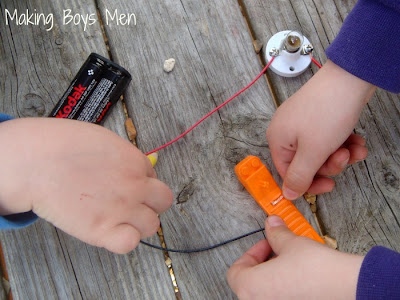
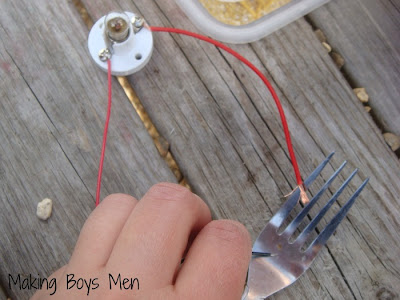
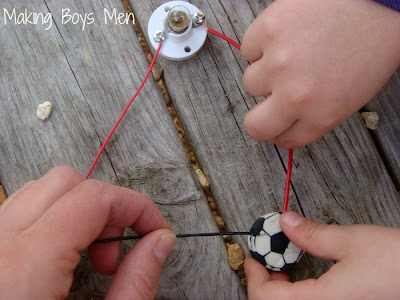
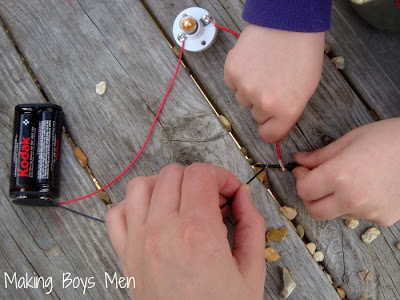
This is great! We did something like it in 6th grade science class, and I thought it was too bad we didn't get to do any electrical projects in school earlier, or ever again for those who didn't take physics in high school. Electricity is such a part of our daily lives, it's useful and interesting to know more about it! I'm lucky that my dad is an electrical engineer who taught me a lot as I helped him fix things around the house.
ReplyDeleteA next step for you might be learning about wiring bulbs in series vs. in parallel.
Thanks Becca, now we've got the basic set up there's heaps we can do, definitely want to try series and parallel circuits and am going to try out hand at switches too. Thanks for stopping by
DeleteWe did a bunch of electricity experiments but followed a curriculum. You are so brave to lead this one on your own. The electrical switch the kids made was my favorite because we deviated away from the directions and experimented a little.
ReplyDeletehttp://highhillhomeschool.blogspot.com/2012/04/make-your-own-electrical-switch.html
Thanks, just checked out your switches I know the boys would love this too
DeletePinning this for future use!
ReplyDeleteThanks for pinning
DeleteGreat idea for children. I've never done this, but it looks like fun! Thank you for linking up to Mom's Library, I'll be featuring this post.
ReplyDeleteCrystal (www.crystalstinytreasures.com)
Thanks for the feature
DeleteGreat idea.. I know my nine year old twins and my 5 year old would love this.
ReplyDeleteI remember my older brother being given a set that taught you how to make all kind of electrical circuits... I loved playing with that!
What a fun lesson!! My electrical engineer husband doesn't let us play with even the simplest of any type of electricity, but I love the idea. Thank you for sharing at Sharing Saturday!!
ReplyDeleteFor me personally, I’ve found that for younger children they grasp the (admittedly advanced) concepts of circuitry better with a (safe) hands-on approach. One of the best ways I've found is by using something called Snap Circuits. They take all of the advanced level calculations out of building circuitry. With a simple google you can check them out. Now your kids won't be making award-winning robots with them, but the circuits will emphasize some very important and fundamental physical principles they'll need (like polarity, contact, current, etc.) and the kids will have some fun doing some pretty cool, albeit simple sciency things like turning on and off LEDs or driving small toy motors and watching them spin. They enjoy it so it's good. I found this beginner kit online and it seems to be pretty good: http://www.ebay.com/itm/B-Squares-Portable-Magnetic-Electronics-Kit-/281730406696?pt=LH_DefaultDomain_0&hash=item419870d928
ReplyDeleteI love this idea of getting little men (and women) into electricity and learning it's properties. There are many amazing career paths that relate and it is always good to be able to understand the systems in your home! Thanks for sharing!
ReplyDelete